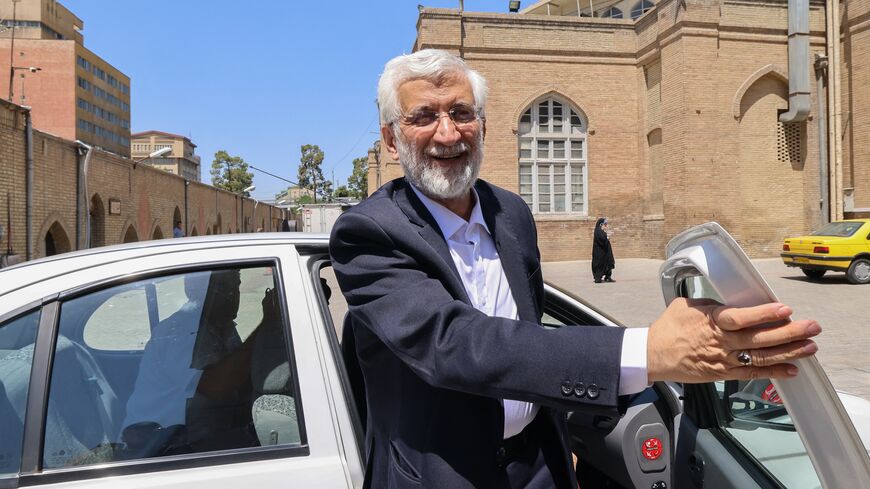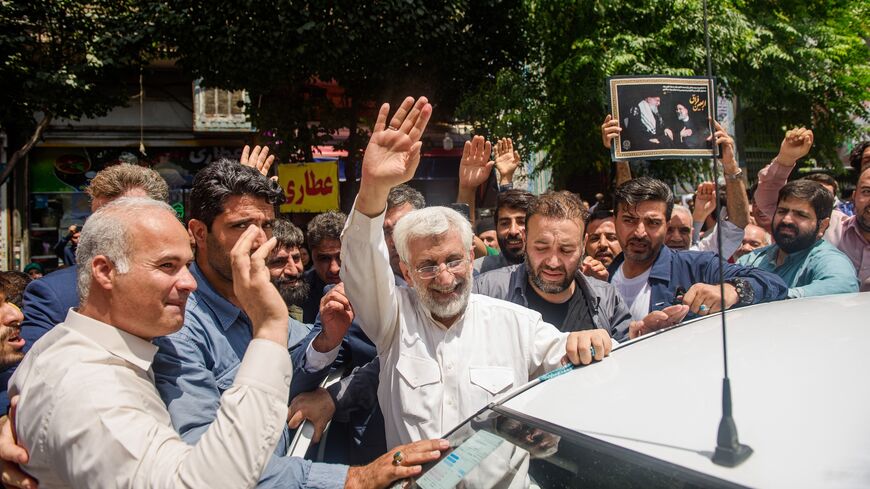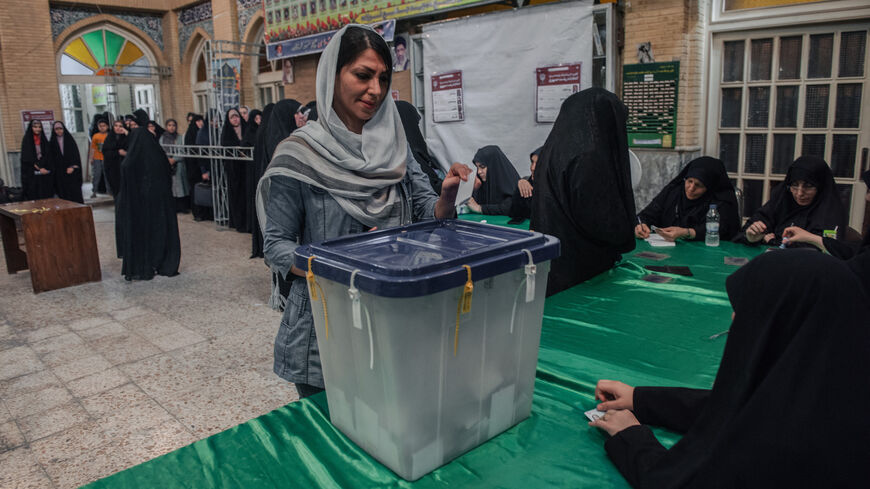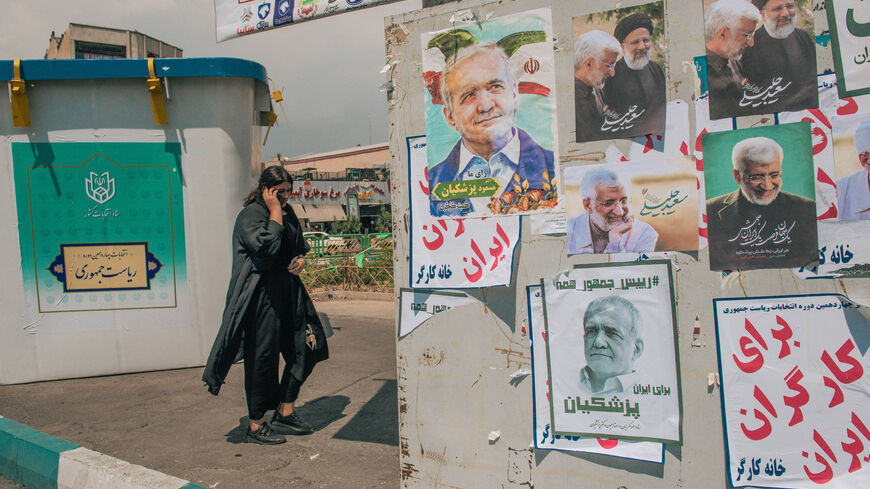Iran election: With 4 candidates left, hard-liners rally behind Ghalibaf, Jalili
Hard-liner Saeed Jalili and Reformist Masoud Pezeshkian topped two recent polls, though many Iranians say they don't plan to vote amid widespread opposition to the government.

With two conservative candidates dropping out of Iran’s presidential race on the eve of Friday's vote, the country's hard-liners are closing ranks behind two main figures as the sole Reformist contender could surprise.
Tehran Mayor Alireza Zakani announced Thursday on X that he was pulling out of the race after previously denying he would do so. On Wednesday, Vice President Amir-Hossein Ghazizadeh Hashemi announced his withdrawal on the social media platform.
The following candidates remain in Friday’s race after the exit of Zakani and Hashemi:
- Mohammad Bagher Ghalibaf, the speaker of the parliament
- Saeed Jalili, a former secretary of the Supreme National Security Council and nuclear negotiator under former President Mahmoud Ahmadinejad
- Masoud Pezeshkian, a Reformist member of parliament
- Mostafa Pourmohammadi, a cleric and justice minister for former President Hassan Rouhani
Jalili and Ghalibaf are considered hard-liners, as are Zakani and Hashemi, leaving Pezeshkian as the sole Reformist. Pourmohammadi is often labeled a conservative, but surprised observers with his pledge to rescind Iran’s hijab law during the June 21 debate, according to the London-based Iran International news station. Iran experienced widespread protests in 2022 in relation to the law after young Kurdish woman Mahsa Amini died in police custody following her arrest for "improperly" wearing the mandatory hijab.
Friday’s election was scheduled following the death of President Ebrahim Raisi in a helicopter crash last month.
Why it matters: Ghazizadeh Hashemi voiced support for Ghalibaf, Jalili and Zakani when he announced his withdrawal, citing efforts to “strengthen” the forces of the “revolution,” referencing the 1979 Islamic revolution that created the current system. Zakani similarly called on Ghalibaf and Jalili to “unite and not leave the revolutionary forces' rightful demands unanswered.”
A June 22 poll from the Netherlands-based Group for Analyzing and Measuring Attitudes in Iran found Pezeshkian stands at 37.7% of the vote, Jalili 29.4% and Ghalibaf 8.3%, with another 18.4% undecided among those who plan to vote. Among Iranians who are undecided about voting, the poll showed 37.8% support for Pezeshkian, 2.3% for Jalili and 1.7% for Ghalibaf. Pourmohammadi received less than 1% in each category.
A June 20 poll from the government-affiliated Iranian Students Polling Agency showed Jalili with 26.2% support, Pezeshkian with 19.8% and Ghalibaf with 19%.
The final presidential debates took place on Monday and Tuesday and were dominated by foreign policy. Ghalibaf, Ghazizadeh Hashemi, Jalili and Zakani criticized Rouhani over his handling of the nuclear deal. Pezeshkian, a Rouhani ally and a defender of the deal, accused his rivals of failing to present an alternative to the accord, wrote Al-Monitor’s correspondent in Tehran.
The United States withdrew from the Iran nuclear deal in 2018 under President Donald Trump, leading to the reimposition of sanctions and their negative effects on Iran’s struggling economy. The deal had removed sanctions on Iran in exchange for the scaling back of its nuclear program.
A record-low turnout is expected on Friday. A whopping 65.5% of respondents in the GAMAAN poll said they will not vote in the election, compared to 22.4% who said they will and 12.1% who are undecided. Opposition to the overall Islamic Republic system was the reason given by 67.6% of nonvoting respondents. In the ISPA poll, 42.5% had definitely decided to vote.
The turnout for Iran’s last presidential election was 48.8%, the lowest since the establishment of the Islamic Republic. Turnout for the March parliamentary elections in Iran was around 41%, another low since 1979.
In a Tuesday speech, Supreme Leader Ayatollah Ali Khamenei called for “maximum” voter turnout. He avoided criticizing any candidate directly, but advised the candidates against working with individuals who are “infatuated by America and who think that without America no step can be taken forward.”
The Associated Press described Khamenei’s comments as a veiled critique of Pezeshkian. The parliamentarian has attracted large crowds across the country and higher turnout could actually benefit him, according to the outlet. Former Foreign Minister Mohammad Javad Zarif, who negotiated the nuclear deal, is among Pezeshkian’s supporters.
What’s next: More than 50% of the vote is needed to win the election. In the event that no candidate achieves it, a runoff election will be held between the two candidates with the most votes.







